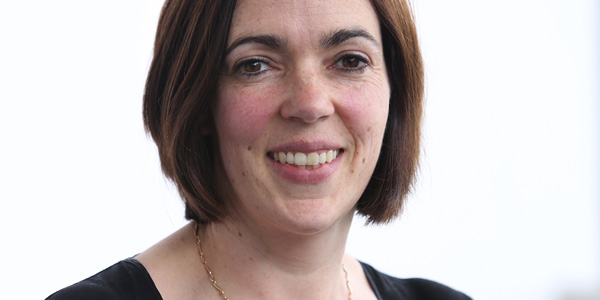
March 6, 2015, by Tara de Cozar
Engineering — not just for boys
It’s International Women’s Day today. So it seems appropriate to share the thoughts of one of our top engineers on the subject of how STEM subjects are VERY DEFINITELY #notjustforboys
Being in an engineering faculty means working closely with industry, and seeing the impact of our work on real systems. That’s certainly #notjustforboys — says Professor Sarah Sharples
My mum was a #femalefirst – the first female computer programmer for the Ministry of Technology in the 1960s. She used to tell me and my brother and sister that her last job before she stopped work to get married (a sign of the times!) was to help convert the inland revenue tax system from using old money to new decimal money. Having female role models in the workplace and the home has always been important.
I didn’t set out to become a female in a male-dominated world, I just studied what I was interested in and, after my psychology degree, found that the area that I was most interested in pursuing was Human Factors, based within the Faculty of Engineering at the University of Nottingham. I loved being in an engineering department from the word go. In engineering, people come with all sorts of background – in my department there are people with degrees in physics, chemistry, maths, design and biology, as well as those who have come through an engineering route. I’ve been lucky enough to work with a number of different industries and digital technologies in my job – my projects have included work with railways, air traffic control, manufacturing technologies, smart phones and advanced positioning technologies, and healthcare.
As I’ve become more senior, I’ve realised how important it is to support women as they pursue careers in STEM (Science, Technology, Engineering and Mathematics) areas. In my experience, working in teams that have diversity in all areas, whether gender, sexuality, culture or academic background, leads to better design and more successful solutions. People that are different bring different perspectives to problem solving, and one of the skills that human factors brings is to combine the needs of different people, roles and systems into a single design that is effective, efficient and satisfying to use.
We don’t have enough women in engineering, and I sometimes describe myself as having become an ‘accidental ambassador’. At Nottingham, we are very proud of supporting our female colleagues as they pursue an academic career (in 2014 five academics were promoted from lecturer to Associate Professor in the Faculty of Engineering – all of them were female), but we still recruit and promote more men than women. Many colleagues (such as Athene Donald at the University of Cambridge) have written much more eloquently than I could about the reasons why this is the case, but one thing that we can all do to help women to pursue what are considered ‘traditionally male’ careers is to talk about how much we love our work. We can also encourage as many women as possible to gain the core subject skills that are needed to work in these areas – my maths, physics and chemistry A levels come in useful almost every day (a good understanding of chemistry is also extremely useful when cooking!), and in my first year of my Psychology degree I also took Computer Science, which has proved invaluable as I supervise technical students now in much of my work.
So when I became a Professor in 2012, I made sure that this was something that I was proud of, and (whilst I hope still retaining a small amount of modesty!) used my more senior position to make myself and other women academics noticed. When I was earlier in my career I was uncomfortable about supporting initiatives that were focussed on women – the last thing I wanted was for people to think I’d been promoted, or given a new role, because I was a woman, rather than because I deserved it or was the best person for the job. But now I realise that sometimes women aren’t as good at talking about their achievements as they should or could be, and we all need a bit of encouragement (as indeed I did before I wrote this blog!). I’ve also made sure that when I’ve been offered roles, whether on advisory committees, with industry or in leadership positions, I’ve tried my hardest to take them (even when my first reaction when asked has honestly been to check whether they are sure they are asking the correct person!). By showing how satisfying a career in an area like engineering can by, by demonstrating how our work can change lives, and help us to teach others, maybe we can encourage more women to follow our path.
I’m not going to pretend that it isn’t hard work (I’m writing this just before 10pm on a Wednesday evening, when I really should be reading a PhD thesis or proof-reading the index of my new book) but my job is a lot of fun. And it most certainly is #notjustforboys.
Sarah Sharples
Professor of Human Factors,
President-Elect of the Chartered Institute of Ergonomics and Human Factors.
Co-Director, Horizon ‘My life in data’ Centre for Doctoral Training
Lead of ‘Digital Futures’ global research theme, University of Nottingham
Non-executive Director, Transport Systems Catapult
Wife to one very patient husband, Mum to two lovely kids. Occasionally grumpy, a bit forgetful, quite often tired, but very happy.
No comments yet, fill out a comment to be the first

Leave a Reply